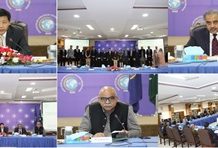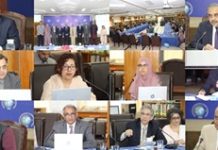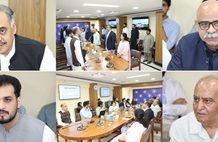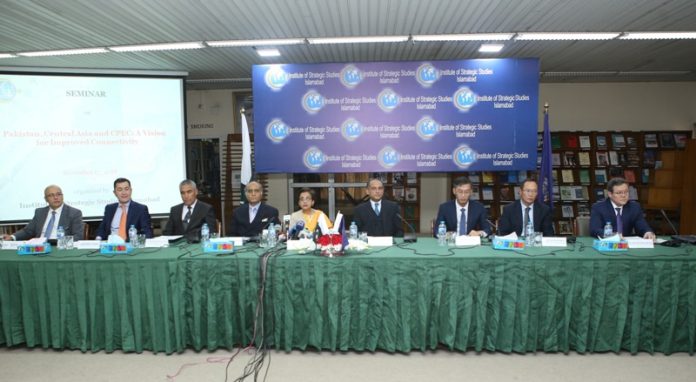PRESS RELEASE
Seminar
on
“Pakistan, Central Asia and CPEC: A Vision for Improved Connectivity”
Institute of Strategic Studies Islamabad
November 13, 2018
“Connectivity is the name of the game of the century – every country wants to increase connectivity and Pakistan too is desirable of this. After all, connectivity and mobility facilitate prosperity and well-being of the region.” This was stated by Ms. Tehmina Janjua, Foreign Secretary, Ministry of Foreign Affairs of Pakistan during her address as Chief Guest at a seminar on “Pakistan, Central Asia and CPEC: A Vision for improved Connectivity” organized by the Institute of Strategic Studies Islamabad (ISSI) today.
Other speakers at the seminar included: H.E Mr. Yao Jing, Ambassador of the People’s Republic of China; H.E. Mr. Barlybay Sadykov, Ambassador Extraordinary and Plenipotentiary of the Republic of Kazakhstan; Mr. Erik Beishembiev, Ambassador Extraordinary and Plenipotentiary of the Kyrgyz Republic; H.E. Mr. Sherali Jononov, Ambassador of the Republic of Tajikistan; H.E Mr. Movlamov Atajan Nurlyevich, Ambassador Extraordinary and Plenipotentiary of the Republic of Turkmenistan; and H.E. Mr. Furqat Sidiqov, Ambassador Extraordinary and Plenipotentiary of the Republic of Uzbekistan.
Ms. Janjua stated that the China-Pakistan Economic Corridor (CPEC) has added greater vigor and vitality to the region and Pakistan is proud to be part of this project which falls under the wider Belt and Road Initiative (BRI) and is seen as greatly contributing to the socio-economic environment of Pakistan. She went on to say that both geographically and historically, the only logical routes for the Central Asian States to the sea are through Afghanistan and Pakistan. The launch of CPEC has provided an opportunity to enhance this connectivity.
The Foreign Secretary emphasized the need to work hard on the nine special economic zones which she called “engines of growth”. Combined with investment in socio-economic sectors. CPEC provides opportunities to both friends and neighbors and can act as catalyst for economic change in the region. She stated that it should not be forgotten that Central Asia has been connected to Pakistan for centuries, and due to its location, the country provides the shortest route to the Arabian Sea. So, in essence, through CPEC the countries part of it are building on the links of the past.
All the ambassadors present reiterated their interest in taking part in CPEC and underscored the ways in which their respective country would benefit from the project. The main points raised by the speakers were that countries which might become part of the CPEC project need to further develope their respective national policies, because while geographical connectivity and economic development are important, a linkage of their national policies will help peace, stability and prosperity of the region ten folds. Connectivity is both physical and conceptual. There is also a need to focus on introducing digital solutions in the area, as is the need for creating more centers and forums for Central Asian studies. All speakers agreed that through opportunities of transport that CPEC will provide, it will not only become a network of connectivity, but also an energy generator and trade booster among many other things. Using both inland and sea routes, regional players have an ideal opportunity to transform geo-political competition into geo-political cooperation.
Earlier, in his welcome remarks, Director General ISSI, Ambassador (Retd) Aizaz Ahmad Chaudhry stated that leaders of both China and Pakistan have shown a political will to connect the region in multiple ways. Hence, CPEC is a gambit of connectivity to bring prosperity to the entire region. The current level of trade in the region is not high and could receive a boost through both BRI and CPEC. However, an enabling environment is key, as is addressing the human resource in the region. Another factor is peace and prosperity in Afghanistan, which if achieved, would give an added boost to the prosperity and development of the region.
Chairman ISSI, Ambassador (Retd) Khalid Mahmood, in his concluding remarks said that while previous interstate relation models are jostling and competing with each other, the Chinese model emphasizes common development. At present, it encompasses more than sixty countries. The instability in Afghanistan is a major impediment as are strict visa regimes, lack of air connections, and of course, the language barrier. These must be addressed immediately in order to achieve the full potential of the CPEC project.













